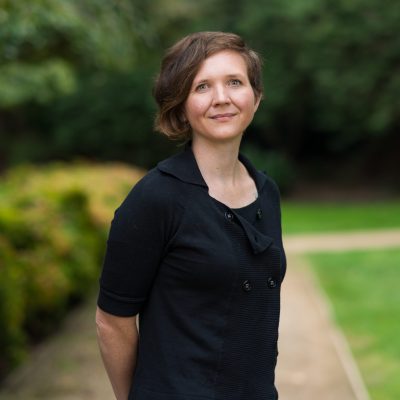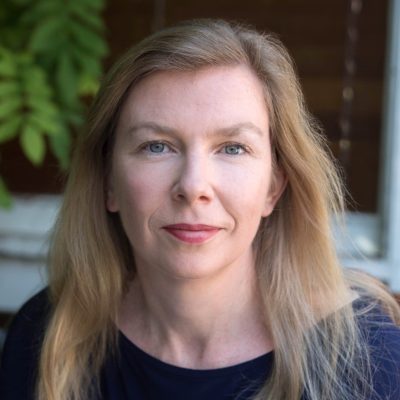Creation
Catalysing Climate Conscious Legal Education Through Open Education Resources
La Trobe University
Dr Julia Dehm; Zoe Nay; Dr Nicole Graham; and Steven Chang
Overview
This case study outlines an integrated project called Climate Conscious Lawyers that aims to transform legal education. It uses Open Education Resources (OER) to address climate change challenges in the legal profession. The project’s vision is to ensure the next generation of legal professionals are equipped with the expertise to deliver legal services and promote justice in a world transformed by climate change.
The main project outputs are:
- a core content open-access textbook Becoming a Climate Conscious Lawyer: Climate Change and the Australian Legal System
- a forthcoming Educators’ Companion to support integration of the core text into curriculum.
In this case study, we seek to demonstrate the power of using OER to create “living” resources and build communities of practice around those resources. This case study also illustrates the benefits of a staged system of progressively publishing chapters in three “tranches” from mid-2024 to mid-2025.
We conclude by making recommendations to other open practitioners and educators on planning OER projects in a holistic way that are highly integrated with:
- curriculum change initiatives
- professional practice
- community-building.
How to use this case study
Academic teaching staff can learn how to:
- use OER as a deliberate catalyst for changing education in your discipline
- formulate diverse strategies for OER implementation
- create a ‘living open textbook’ that responds to practise
- grow an OER team by attracting authors
- manage larger edited volumes
- establish the foundations of a community of practice linked to an OER
- plan OER promotion in a targeted way.
Open education staff/librarians/learning designers can learn how to:
- embed OER development within broader academic projects & practices
- use staged OER development models to minimise workload challenges
- identify grant applications and funding opportunities that align with OER projects.
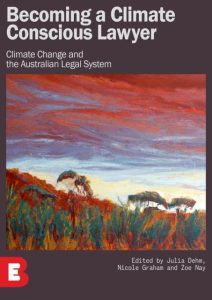
Why was this resource needed?
The publication of the OER was a central part of a broader project to transform the curriculum of professionally accredited Australian law programs to produce more “climate conscious” lawyers who have the skills and knowledge necessary to be thoughtful, strategic and successful legal advisors and advocates in a world grappling with intersecting and complex climate impacts. Climate change impacts and the transition to a low-carbon society are already posing fundamental challenges to key legal doctrines and principles and transforming many areas of law. The widespread legal change necessary extends beyond the specialised fields of ‘climate’ and ‘environmental’ laws and implicates all areas of law and legal practice. Law graduates will need a transformative legal education to enable them to practise law as ‘climate conscious’ professionals with relevant competencies and effective strategies to facilitate their clients’ interests in a climate-changed world. For this reason, the mainstreaming of climate change considerations across all fields of legal education is urgently necessary.
We suggest there are three potential pathways for mainstreaming climate change considerations in professionally accredited legal education (Dehm & Nay, 2024). These are:
- Supplementing: individual legal educators include informal and/or incidental discussion with students and/or supplementary readings and learning activities about legal developments and case law relevant to climate change and the unit content in a core or elective unit(s) of study
- Embedding: unit of study convenors purposefully integrate climate change-related legal developments and/or questions as a formal learning outcome of a core curriculum unit of study, aligned with the learning materials, activities and assessment of the unit, or coordinated by multiple unit of study convenors across multiple units of the core curriculum
- Centring: faculty leadership and/or program directors formally integrate and express climate change-related capabilities as one or more program-level learning outcome(s), designed and delivered at the university or faculty level through curriculum review/creation processes.
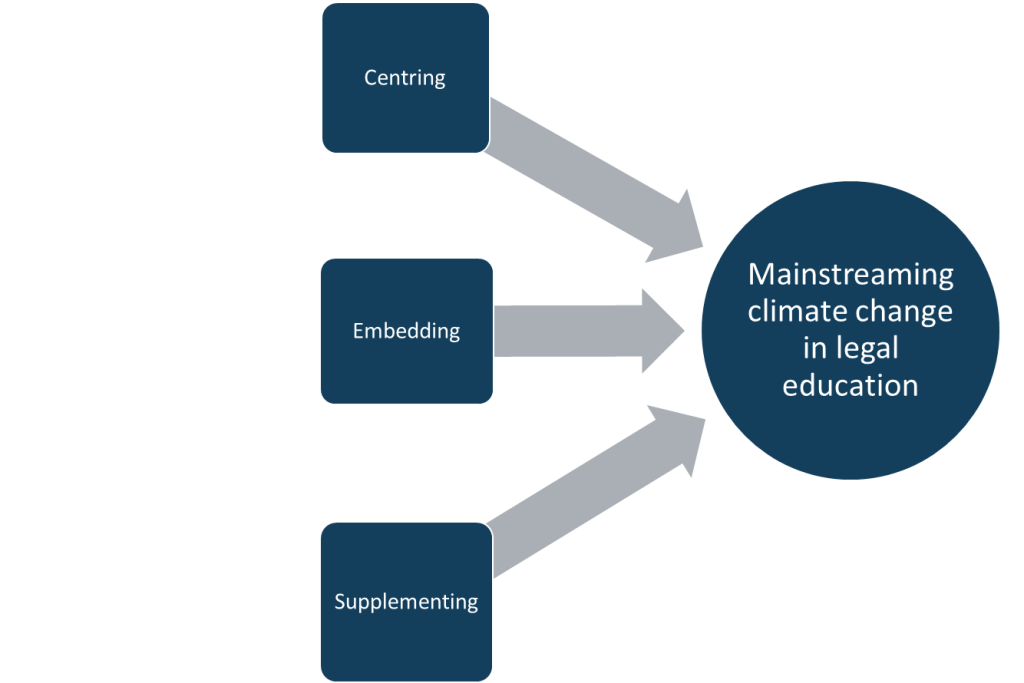
Drivers of change
For all of these pathways, similar prerequisites are needed:
- awareness of the reasons for climate mainstreaming
- educational resources to be used by educators in climate mainstreaming
- networks of peer support to encourage each other in the practice of climate mainstreaming.
Intersecting project components
Our project to transform Australian legal education has three interrelated objectives. These are:
- Mapping curricular and pedagogical change: A survey of Australian legal educators (Sept-Oct 23) revealed that although climate change is considered and discussed in many core law units of study, several barriers to mainstreaming climate change in legal education were encountered including a lack of: resources, knowledge about climate change related legal practice, and best practice climate mainstreaming pedagogies.
- Developing educational resources: including this world-first open access textbook showing how climate change impacts are relevant to all areas of law and proposed Educators’ Companion.
- Building a community of practice (CoP): to promote the resources and support the shift towards ‘climate conscious’ legal education, including hosting national and international workshops and conferences, developing a website to centralise resources and share best practices, and raising awareness through conference presentations.
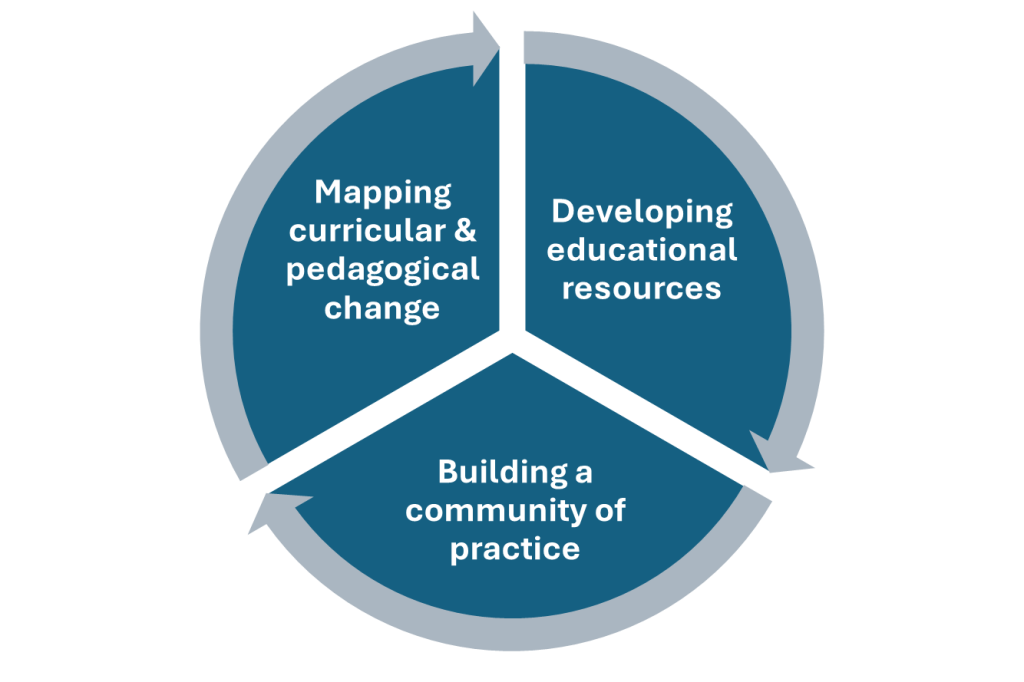
As illustrated in Figure 3, progressing these three separate objectives mutually reinforces each other. The survey provided the editors with the opportunity to listen and learn from legal educators about their experiences and needs, which enabled them to design the OER in a way that was responsive to those needs. Their process adopts the ‘Listen, Link, and Lead’ approach outlined by Scott and Fullan (2009) for leading change to higher education. The inter-related functions of these objectives encouraged many survey respondents to deepen their engagement by taking up project roles themselves, as authors and peer reviewers who contributed to developing the OER.
Why OER?
From the initial stages of conceptualising this project it was clear that a conventional legal textbook would be inadequate to the task. Given the rapidly changing legal and policy landscapes related to climate change, and the changing demands of users (both educators and students), it was necessary to create a book that was more dynamic and interactive than conventional publishing models could produce. Open licensing technologies made it possible to create an equitable, adaptive, interactive and dynamic resource. Using an OER enabled:
- open access at no cost, reducing the cost of education and financial barriers and burdens for law students
- scalable impact through rapid uptake across multiple institutions and organisations
- flexible localisation of content – enabling adaptation for jurisdictional contexts or other specific organisational purposes
- long-term sustainable impact as a “living text” that enables fast and decentralised online updates to keep content current, accurate, and relevant
- a strong exemplar for ethical use of learning technologies for social good
- reader interaction via digital affordances and the possibility of student and teacher collaborations.
Building a community around the OER
Through the process of developing OER resources for climate conscious lawyering, we have built a rapidly growing community of practice around the text with 45 individual contributors from 15 Australian law schools contributing to 26 chapters, as well as legal practitioners and jurists. The community of practice also includes many of the survey respondents, who became key members of the community of practice, who would promote the resource to their colleagues and drive take up, as well as librarians and academics staff from Australian universities. In this sense, the project can be understood as a Third Space project (Whitchurch, 2012), given how it operated as an interface between academic and professional practice, both within and outside of the university context. (See Figure 4.)
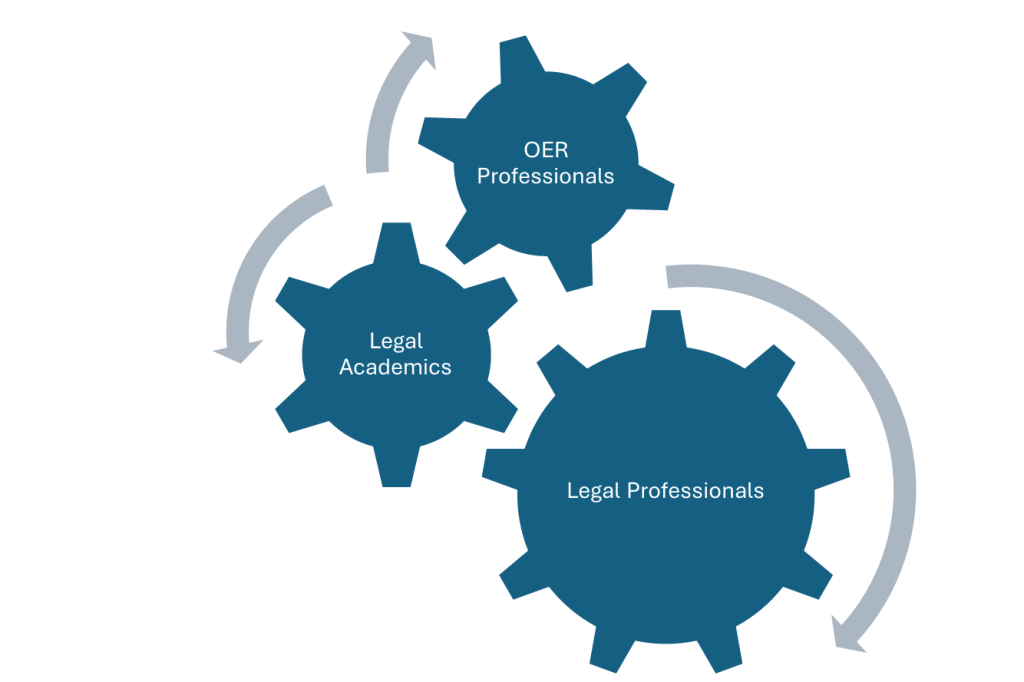
The initial team
The project was initiated and driven by the editors of the OER. The editors were a team of legal academics, each passionate about climate change, each at different stages of their careers (an associate dean of education, a mid-career researcher, and a PhD Candidate).
Growing the OER team and attracting authors
The editors identified and approached multiple subject-area specialists, inviting them to participate in the project by authoring or co-authoring a chapter on their area of research and/or teaching expertise. As the editors publicised the project at various conferences and other events, they were often approached by colleagues asking if there was already a chapter on a specific subject-area, and if not, whether they might contribute such a chapter to the book. The staged publication model (see Figure 5) made it possible to incorporate new chapters in a later tranche of the OER.
Peer reviewers to ensure quality
Each chapter was double peer reviewed to provide feedback to authors on the quality, reliability, comprehensiveness and relevance of the submission. For most chapters, the editors solicited both academic and practitioner reviews to assure both the academic rigour and practical relevance of chapters to equip students for the subject-related challenges of legal professional practice. This allowed the editors to develop a stronger relationship with lawyers at the forefront of climate law and litigation.
Champions of the projects
The editors invited prominent jurists (including the Chief Justice of the New South Wales Land and Environment Court) to lend their support for the book by writing the Foreword – raising its profile and standing.
Close collaboration with OER experts
This project was developed through close collaboration and partnership with open education experts at the La Trobe eBureau. Operating in the Third Space prompted deeper methodological reflections on the practice of developing OERs; how to utilise technological capacities to promote accessibility and engagement; and how to create “living resources” that remain up to date in light of the changing legal and policy environment. The close collaboration with the eBureau fostered new ambitious branches of the project, such as the development of an Educators’ Companion to the core text (more details below).
How was the project designed and implemented?
This project was designed to support the integration and mainstreaming of climate change-related legal developments and considerations into the curriculum of professionally accredited law programs across Australia. The project was funded by the Victorian Legal Services Board Grants Program and a small grant from La Trobe Law School. These grants made it possible to hire a Research Assistant/Project Manager to coordinate the project, to pay peer reviewers and to cover additional costs associated with the project.
One early priority was to ensure as much consistency in tone and style throughout the textbook notwithstanding multiple authorship. We developed our Guidelines for Authors to define the book’s purpose and objectives; its pedagogical approach; provided stylistics and formatting guidance; proposed sample structure to each chapter; and provided information about the copyright considerations of technological capabilities of open digital publishing and accessibility considerations.
We held several initial online workshops with invited authors where the editors and members of the publishing team discussed the book, its purpose and the Guidelines. These workshops also allowed numerous members of the team from across Australia to meet one another and build a sense of community and shared purpose.
Later in the writing process, the editors held a further round of online workshops at which authors could share their works-in-progress and receive feedback from the authors of other chapters, and the editors. The workshops helped the editors and authors to identify various points of intersection between the chapters, as well as shared themes and concerns across various chapters. This will increase the coherence of the book as a whole.
A staged publication model
Early on a decision was made to publish the OER over time through sequential “tranches”. This staged publication model enabled chapters to be published and available for education use as soon as possible. The first tranche of three chapters was published in mid-2024, and the subsequent two tranches will be published in early and mid-2025. The staged publication timeline also helped manage the editorial workload involved, especially around peer review, copy editing and layout design. An unexpected benefit of this staged publication model was that it made it possible to recruit and/or accept new authors of new chapters that were not included in the original plan, and enabled staged incorporation of feedback to improve the author guidelines.
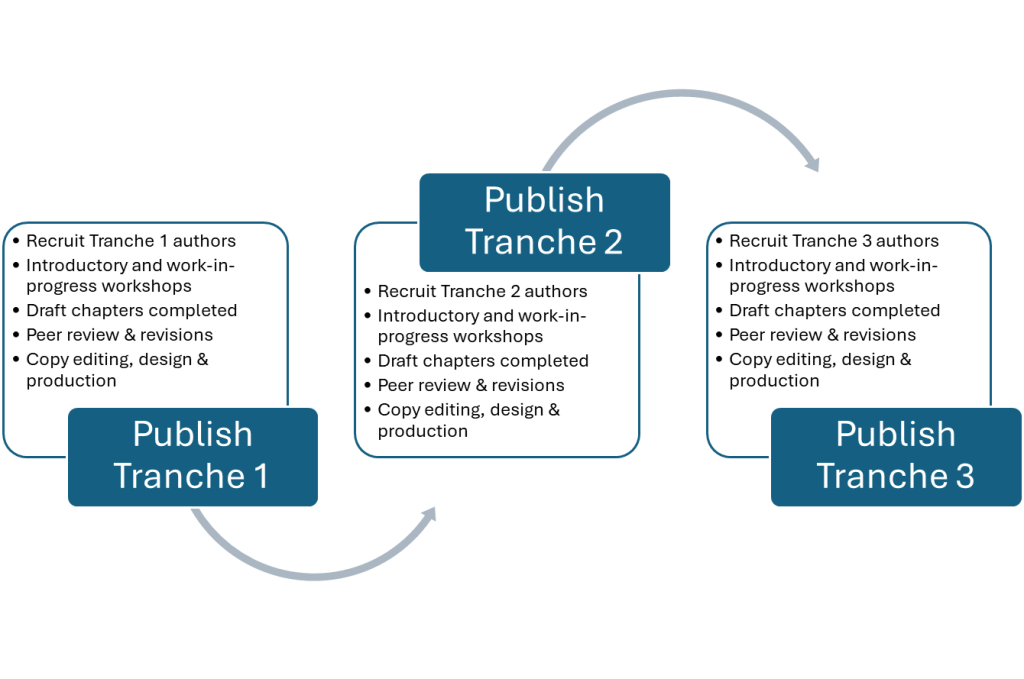
Planning for impact by flipping the script on dissemination
Many OER projects plan book promotion as a discrete post-publication phase. We successfully experimented with a different promotion model that is a continuous cycle and begins at the outset of OER development. This was a decisive approach that created powerful feedback synergies with our staged tranche-based model (see Figure 6). The momentum generated from this led to community feedback and an ongoing recruitment flow of new co-authors whose new chapters will form Tranches 2 and 3. A key ingredient for this was situating the OER within a greater project of changing Australian legal education. This mobilised pre-existing framing and resources (e.g. the survey phase) to attract co-authors and accelerate OER development from an early stage.
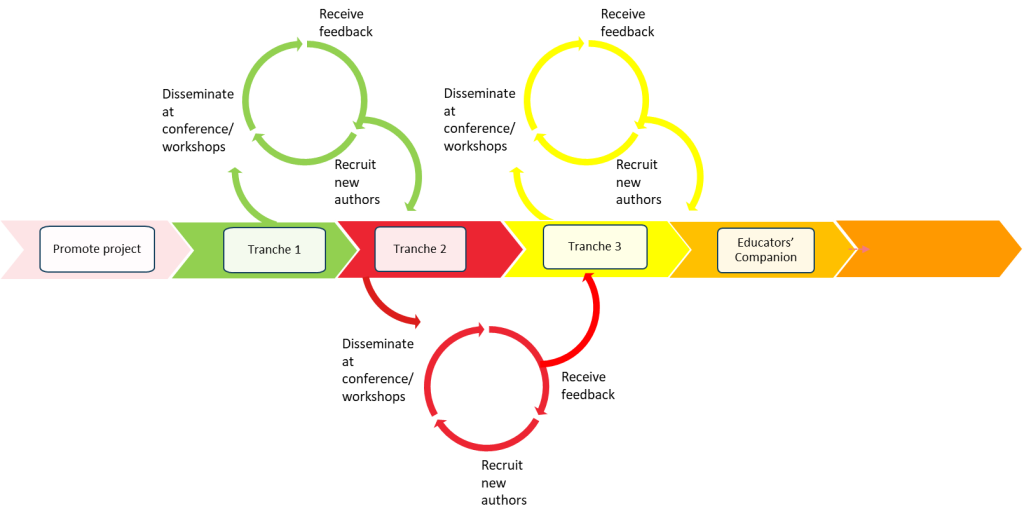
We developed a project website, Climate Conscious Lawyers, to provide resources to help legal educators embed climate change considerations in different units of study in both the core and elective curricula. It also provides users with updates on cutting-edge research about climate considerations in legal education in Australia, as well as relevant bibliographies and policy documents that highlight the need for a more climate conscious legal practice.
We established a mailing list (using MailChimp) to build upon the community created by the initial project survey, and used it to share important news – such as the book launch and publication of new chapters – with interested academics, librarians and legal professionals. We also created a LinkedIn page to reach a wider and potentially international audience.
We prepared a publicity pack (including template PowerPoint slides, flyers and other materials) that could be used by the editors, the eBureau team and chapters authors when speaking at conferences. Collecting these expanding project materials in one place created unexpected benefits, such as repurposing them to write grant applications more efficiently.
We circulated information about the publication of the first Tranche to the national network of Law Associate Deans (Education) and Legal Librarians, as well as to our mailing list and on social media.
Reflections from project participants
Some of the project participants reflected that they found it meaningful to work on a project that was focused on empowering law students to understand how they can use their legal education and subsequent professional careers to respond effectively to diverse and complex disputes relating to climate change. Participants contrasted this to their scholarly work, which may be less accessible and engaging for students, and which may have a more limited audience.
Some of the authors shared with editors accounts of tensions between contributors about whether the content should be focused on gradual and incremental changes to the legal system to promote greater climate consciousness, or whether much more radical critiques of the legal system and radical reimagining of legal possibilities were needed. These tensions – between incremental reform or more radical transformation – foregrounded the need for a new generation of flexible, adaptable lawyers and judges who can adapt readily to change.
Authors were also excited about how the OER can be used to drive further changes in legal education and how it can support initiatives to embed sustainability across different units at any given Law School.
In practice
This project has grown and expanded far beyond what was initially envisioned. What we initially planned as a 12-chapter edited book, has grown to more than 25 chapters. The book has become the ‘principal’ text, soon to be accompanied by an Educators’ Companion. In addition, we have given numerous presentations about our work and have been invited to write academic articles about the project.
From our experiences, we share the following recommendations and resources:
Commit time and resources to project coordination: One of the key challenges in such a large (and growing) project is administration and coordination. We were fortunate to have been awarded a grant which allowed us to employ a Research Assistant/Project Manager. Having a Project Manager has been essential to co-ordinate and manage numerous aspects of this project.
For OER edited volumes, plan how to support editorial teams: The editors worked with the eBureau to promote consistency across the core text by developing dedicated author support resources, such as our guidelines for authors and chapter templates. We also held live workshops where the authors could share work in progress and receive feedback from their peers and editors. However, there remained significant editorial work to ensure consistency across the chapters.
Situate OER within a greater shared project: One of the key lessons from this project was that the development of OER is most successful when it is part of a broader project that generates both interest in and an audience for the resource. There is ongoing work needed to drive take-up of this resource, both by individual legal educators as well as through institutional centering of climate change considerations in Australian law degrees. The OER model is particularly attractive in the context of growing concerns and questions concerning the relationship between large commercial publishers and the producers of LLMs.
Disseminate works in progress early and often: Our project was successful in promoting ‘living’ ideas, resources, and publishing an “in progress” open textbook without sacrificing quality of scholarship. We found that sharing iterative work led to better feedback, more co-authors, and significant project growth. In the spirit of this, we have shared an open repository collection of reusable artefacts from our project.
Next steps
There are several next steps for this project:
- Developing an Educator’s Companion – the first volume internationally to provide learning resources for climate conscious legal education. It will:
- Provide learning activities, case studies and assessment tasks that require students to apply, analyse and evaluate “climate conscious” knowledge
- Provide learning activities and assessment tasks to cultivate and develop “climate conscious” skills, attributes and competencies
- Guide ways of formulating unit and course level learning outcomes which articulate relevant climate change-related content and competencies to support the institutional embedding of these objectives.
- Evaluating and learning from what we have done to date: we are in the process of receiving evaluations by the editors, publishers and authors of the process of publishing Tranche 1.
- Forthcoming Tranches 2 and 3 are in progress: many chapters have been finalised and are currently at peer review, the further tranches will be published in 2025.
- Hosting a national conference later this year on mainstreaming climate change in legal education at which we will promote the resources and educators can share their experiences and learning with their peers.
- Expanding the community of practice of legal educators who are engaged with mainstreaming climate change in their teaching practice and educational leadership. We hope to host local gatherings in different states to bring people together as well as subject-specific events (whether online or in-person).
- Tracking change: we hope to conduct a further survey of Australian law academics in 2025 or 2026 to track progress on mainstreaming climate change in Australian legal education.
Further resources
Climate Conscious Lawyers website
Reusable open artefacts from our project (open repository collection)
References
Dehm, J., & Nay, Z. (Aug 8, 2024). Mainstreaming climate change in global legal education. https://dx.doi.org/10.2139/ssrn.4946167
Fullan, M., & Scott, G. (2009). Turnaround leadership for higher education. Jossey-Bass.
Whitchurch, C. (2012). Reconstructing identities in higher education: The rise of ‘Third Space’ professionals. Routledge.
Image descriptions
Figure 1: Front cover of the core content open textbook Becoming a Climate Conscious Lawyer: Climate Change and the Australian Legal System
Cover art of the open textbook ‘Becoming a Climate Conscious Lawyer: Climate Change and the Australian Legal System’. The cover is brown and features artwork of the Australian outback.
Figure 2: Three pathways to mainstreaming climate change in legal education: top-down institutional approach (centering); decentralised, individual bottom-up approach (supplementing) and a combination of these (embedding)
The graphic features three boxes, each with arrows pointing toward a circle. The boxes are labelled “Centring”, “Embedding” and “Supplementing”. Text on the circle reads “Mainstreaming climate change in legal education”.
Figure 3: Three interrelated project objectives to achieve the broader goal of transforming Australian legal education through the mainstreaming of climate change considerations
The picture depicts a circle divided into three equal parts. Arrows point around the circle, depicting a relationship. The three parts of the circle are labelled “Mapping curricular and pedagogical change”, “Developing educational resources” and “Building a community of practice”
Figure 4: Legal academics (as editors, authors, reviewers), legal professionals (as authors and reviewers) and OER professionals consistently interacting with and learning from each other
This graphic features three connected cogs, two small and one large. The large cog is labelled “Legal Professionals”, while the smaller cogs are labelled “OER professionals” and “Legal Academics”.
Figure 5:The staged publication model and the process of developing and publishing each tranche of chapters
The image depicts a workflow diagram for publishing a book in three tranches: Tranche 1 involves recruiting authors, introductory workshops, drafting chapters, peer review and revisions, and copy editing, design and production. Tranche 2 and 3 follow the same steps as Tranche 1, but with new sets of authors. The arrow between each tranche suggests a sequential workflow, where each tranche builds upon the previous one.
Figure 6: An iterative cycle of OER promotion and publication leading to expansion into new project phases
The image depicts a timeline beginning with “Promote Project”. There are an additional four stages in the timeline, each represented by a coloured box. The boxes are in the following order and are labelled: Tranche 1 (green), Tranche 2, (red), Tranche 3 (yellow), Educators’ Companion (orange).
Tranches 1, 2 and 3 each have a circular arrow, depicting a cyclical process within the stage. Each Tranche’s cycle details that the project is disseminated at conferences / workshops, feedback received and new authors recruited before moving to the next stage of the timeline. There is a pink arrow at the end of the Educators’ Companion box, suggesting a potential continuation of the timeline.
Acknowledgement of peer reviewers
The authors gratefully acknowledge the following people who kindly lent their time and expertise to provide peer review of this chapter:
- Keith Heggart, Senior Lecturer, University of Technology, Sydney
How to cite and attribute this chapter
How to cite this chapter (referencing)
Dehm, J., Nay, Z., Graham, N., & Chang, S. (2024). Catalysing climate conscious legal education through open education resources. In Open Education Down UndOER: Australasian Case Studies. Council of Australian University Librarians. https://oercollective.caul.edu.au/openedaustralasia/chapter/catalysing-climate-conscious-legal-education-through-open-education-resources
How to attribute this chapter (reusing or adapting)
Catalysing Climate Conscious Legal Education through Open Education Resources by Julia Dehm, Zoe Nay, Nicole Graham and Steven Chang is licensed under a Creative Commons Attribution 4.0 International licence.
If you plan on adapting this chapter, please use the following attribution statement: <*Title of your adaptation* is adapted from Catalysing Climate Conscious Legal Education through Open Education Resources by Julia Dehm, Zoe Nay, Nicole Graham and Steven Chang, used under a Creative Commons Attribution 4.0 International licence.

